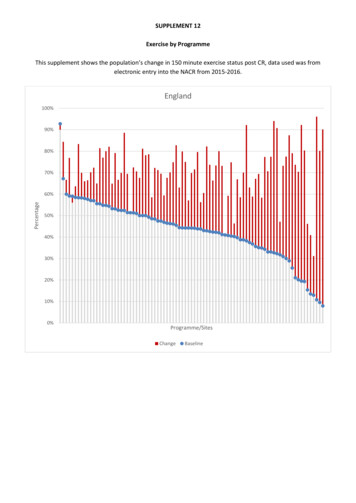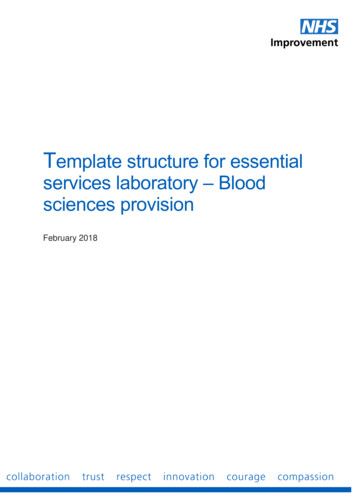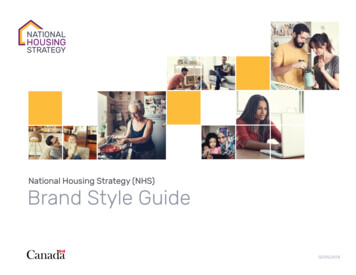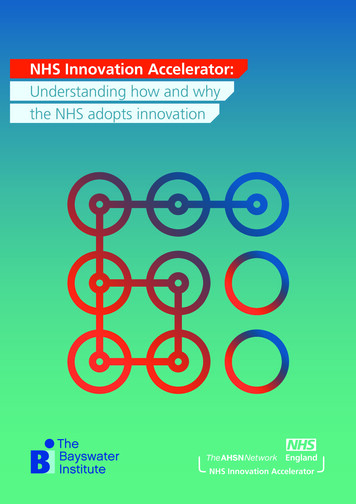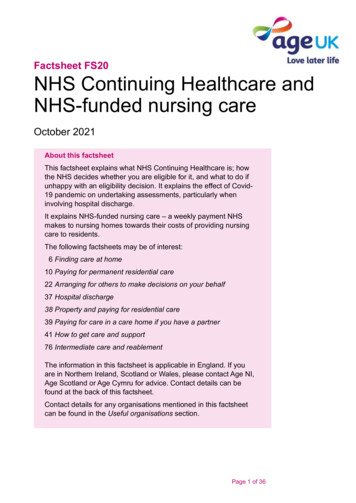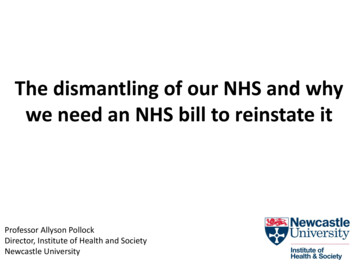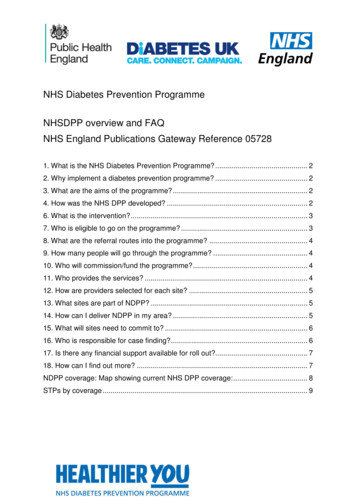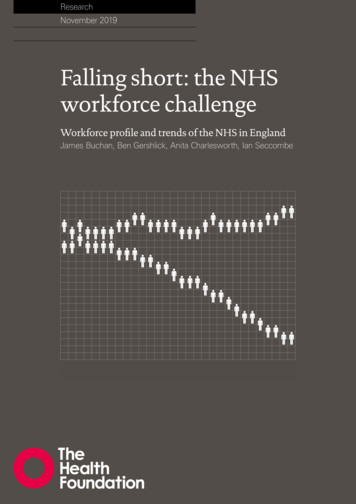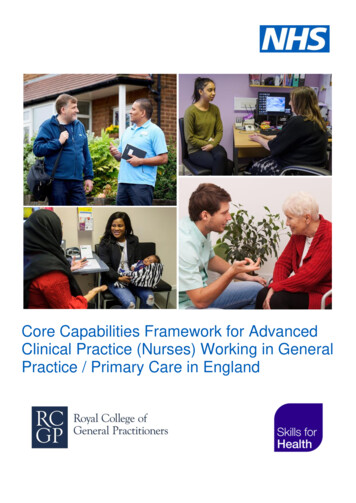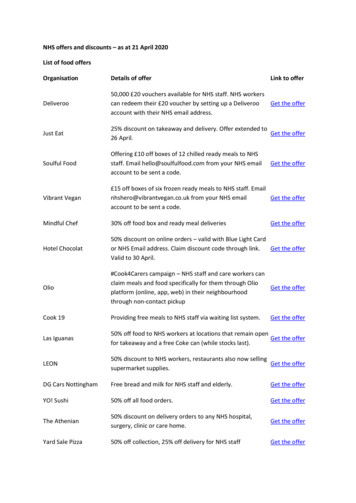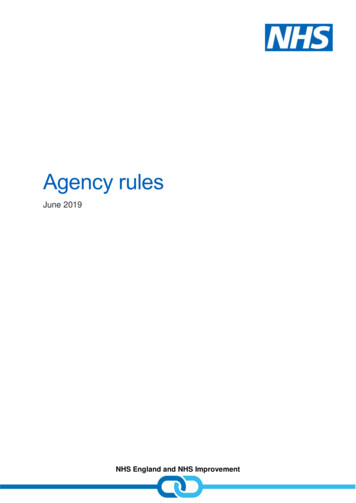
Transcription
Agency rulesJune 2019NHS England and NHS Improvement
The NHS Long Term Plan says that when organisations worktogether they provide better care for the public. That is why on 1April 2019 NHS Improvement and NHS England united as one –our aim, to provide leadership and support to the wider NHS.Nationally, regionally and locally, we champion frontline staff whoprovide a world-class service and constantly work to improve thecare given to the people of England.
Contents1. Introduction . 32. Organisations in scope . 43. Staff groups in scope. 64. Expenditure ceilings . 75. Price caps . 96. Mandatory use of approved framework agreements. 137. Use of admin and estates agency workers. 158. Tax . 189. Overriding the agency rules . 1910. Governance . 2111. Support . 2212. Enforcement. 23Annex 1: Definitions . 25Annex 2: How the price caps are calculated . 28Annex 3: Trust reporting requirements . 29Annex 4: Seven pillars of the price cap . 302
1. Introduction1.1. In 2015 trust spending on agency staff had increased to the extent that it wasone of the most significant causes of deteriorating trust finances. NHSImprovement 1 introduced a set of rules in April 2016 to support trusts toreduce their agency expenditure and move towards a sustainable model oftemporary staffing. In the intervening two years these measures have reducedagency expenditure by a third.1.2. This document sets out all the rules for trusts on agency expenditure, whichare collectively known as the ‘agency rules’. It builds on and supersedesprevious rules documents for trusts. Trusts should refer to this document fordetails on how to comply with all the agency rules, including the requirementsto: comply with a ceiling for trust total agency expenditureprocure all agency staff at or below the price capsuse approved framework agreements to procure all agency staff.1.3. The agency rules apply to all staff groups (ie those listed in section 3).1.4. The agency rules are designed to: 13 significantly reduce agency spendimprove transparency on agency and bank spendbring greater assurance on quality of agency supplyencourage agency staff to return to permanent and bank working.NHS Improvement is the operational name for the organisation that brings together Monitor, NHSTrust Development Authority (TDA), Patient Safety, the National Reporting and Learning System,the Advancing Change team and the Intensive Support Teams. From 1 April 2016 all referencesto Monitor or TDA have in effect been replaced by ‘NHS Improvement’. This document thereforeuses NHS Improvement throughout.
2. Organisations in scope2.1. The agency rules apply to: all NHS trustsNHS foundation trusts receiving interim support from the Department ofHealth and Social Care NHS foundation trusts in breach of their licence for financial reasons.Other NHS foundation trusts and NHS foundation trusts in receipt of financialrecovery funding are encouraged to apply the agency rules.2.2. Throughout this document 'trusts' refers to 'all trusts in scope of the rules'unless otherwise specified.2.3. There is a strong expectation that all other NHS foundation trusts will comply.Year-to-date performance against agency ceiling is an equally weighted metricin the ‘use of resources’ theme of the Single Oversight Framework.2Additionally, the proportion of temporary staff is measured quarterly in the‘quality of care’ theme. Under the ‘use of resources’ theme we may alsoconsider whether there is any evidence that suggests a provider is failing tooperate effective systems and/or processes for financial management andcontrol, and not operating economically, effectively and efficiently. Providersthat are not adequately controlling their agency spend can be investigatedunder these broader value-for-money considerations.2.4. Ambulance trusts and ambulance foundation trusts have been covered by theagency expenditure ceiling and framework rules since 1 April 2016 and by theprice cap since 1 July 2016.2.5. While these rules apply to trusts and foundation trusts, commissioners havean important role in monitoring performance. We encourage trusts to workwith their commissioners to agree plans for services in the event of staffing24 Outlined in: ght-framework/
issues and, where appropriate, to engage wider system partners in developingplans for sustainable temporary staffing across local systems.5
3. Staff groups in scope3.1. The agency rules apply to all staff groups covered by national pay scales: medical staff (including dental staff where applicable)nursing and midwifery staffall other clinical staffall non-clinical staff.3.2. GPs are not covered by the agency rules, except where they would beemployed substantively by a trust (that is, they are on the trust’s payroll).Where this is the case, the appropriate equivalent medical price caps shouldapply.3.3. Very senior managers are not covered by this set of agency rules. Separateguidance applies to very senior managers.33.4. Please see Annex 1 for definitions of terms.36 https://improvement.nhs.uk/documents/429/interim agency VSM approval process.pdf
4. Expenditure ceilings4.1. NHS Improvement sets expenditure ceilings on the total amount individualtrusts can spend on agency staff across all staff groups.4.2. All trusts, including all foundation trusts, have a ceiling.4.3. The annual expenditure ceilings are set in collaboration with NHSImprovement and NHS England regional teams.4.4. Each trust receives its annual ceiling as part of the annual planning round.Trusts with planned agency expenditure above their annual ceiling will need torevise their plans to ensure agency expenditure is at or below their ceiling.4.5. There is a strong expectation that all trusts will comply with this rule, andrevise their plans to ensure agency expenditure is at or below their ceilingwhere necessary.4.6. The monthly profile of a trust's ceiling should match the monthly profile of itsplanned agency spend and be in line with wider trust activity and workforceplans. All trusts should therefore ensure that their planned monthly profile ofagency expenditure is robust.4.7. A trust’s year-to-date performance against its agency ceiling will be monitoredon a monthly basis through the trust’s monthly data submissions to NHSImprovement. All trusts will be held to account against their plannedexpenditure in line with the ‘use of resources’ theme of the Single OversightFramework.4.8. Ceilings are maximum levels, and trusts should reduce agency expenditurebelow these levels as far as possible.4.9. Only in exceptional circumstances will an adjustment to individual trustceilings be considered. Trusts should speak to their regional team or emailnhsi.agencyrules@nhs.net for further guidance.7
4.10. When trusts merge, the ceiling for the new organisation is calculated byadding together the unspent ceiling across the two trusts; the spend trajectoryfor the remainder of the financial year is agreed with the new organisation.The process is the same for an acquisition.4.11. NHS Improvement and NHS England monitors agency spend and maysubsequently adjust trajectories and ceilings as appropriate, or as new databecomes available.8
5. Price caps5.1. The price caps set by NHS Improvement apply to the total amount a trust canpay per hour for an agency worker. Trusts should not pay more than the pricecaps to secure an agency worker, except in exceptional patient safetycircumstances, referred to as ‘break glass’ (see Section 9).5.2. The price caps apply when: an agency fills a shift directlyan agency finds a worker to fill a shift, but the trust pays the worker directlyfor that shift and pays the agency a finder’s fee (all of this expenditure,including payment to the worker, fees and on-costs, should be classified asagency expenditure) an outsourced bank provider releases an unfilled bank shift to be filled byan agency worker (all expenditure, including payments to the worker, feesand on-costs paid to the agency providing the worker, and any additionalhourly or introductory fees charged by the bank provider, should beclassified as agency expenditure) workers are paid through their own limited/personal service company,including where workers are engaged via a third-party limited liabilitypartnership, sole trader or an umbrella company.5.3. The price caps do not apply to: substantive/permanent staffbank staff (both in-house banks and outsourced banks)overtime payments to substantive/bank staff (eg waiting list initiatives)staff employed by a trust on a fixed-term contract.5.4. The price caps apply to all staff providing NHS services at the trust and to allspecialties and departments, subject to paragraph 5.3.5.5. The price caps also apply to agency workers who are contracted on asessional or fee-for-service basis.9
5.6. The price caps set are the maximum total hourly rate that trusts can pay for anagency worker. The price cap is designed to ensure that agency workers arepaid in line with NHS substantive pay rates and comply with all regulations,including agency worker regulations.5.7. Price caps for all staff are calculated at 55%4 above basic substantive payrates. This takes into account holiday pay (annual leave and bank holidays),employer National Insurance contributions, a nominal employer pensioncontribution and a modest agency fee; see Annex 2 for further details on howthe price caps are calculated and Annex 4 for further details on the sevenpillars of the price caps.Table 1: Price caps as a percentage above basic substantive hourly ratesStaff groupsMaximum charge from1 Apr 20165Junior doctors55% above basic ratesOther medical staffAll other clinical staffNon-clinical staff5.8. The price caps include worker pay and all other elements of the payment,including all expenses such as travel and accommodation.6 Trusts cannot payother additional sums to agency workers or to agencies.5.9. The price caps represent the maximum that trusts can pay and should not beinterpreted as standard or default rates.4This figure may differ by small percentages to track variations to relevant contractual changes andchanges to employment law.5The price caps (ie 55% above basic pay rates) have applied to ambulance trusts and ambulancefoundation trusts from 1 July 2016.6The price caps do not include travel costs as part of the role where these would normally be paid toa substantive worker, eg for home visits.10
5.10. Trusts that currently pay agency staff below the capped rates are expectednot to exceed the rates they currently pay, except to comply with legalobligations.5.11. Price caps, excluding any relevant VAT, are set out on our website. Price capsare based on standard NHS pay scales and may be revised in light of anychanges to contracts for substantive workers.5.12. There are different price caps for high cost supplement areas, in line withAgenda for Change (AfC).7 The full set of price caps can be found on ourwebsite.5.13. For medical and dental staff, rates are set for eight pay scales. Two differentrates apply for ‘core’ hours and ‘unsocial’ hours. For the purposes of theagency price caps, core hours are defined as 7am to 7pm, Monday to Friday(excluding bank holidays). Unsocial hours are all other hours. On-call hoursshould be treated the same as core or unsocial hours, depending on whenthey fall. Neither high cost area supplements nor regional supplements areapplicable to medical and dental staff.5.14. The price caps will be reviewed in line with adjustments to national pay scalesas appropriate.5.15. Trusts need to be aware of their responsibilities under the Agency WorkersRegulations 2010 and Working Time Regulations. This includes ensuring thatafter the first 12 weeks of their engagement (including workers who a trust haspreviously engaged in a similar role with a gap of less than six weeks betweenengagements), agency workers are entitled to treatment equal to anequivalent substantive employee, including pay and annual leave.5.16. The price caps remain the same regardless of the length of time an agencyworker spends on assignment.5.17. Trusts will therefore need to consider whether long-term reliance on agencystaff is appropriate and sustainable at or below the price caps.711 The London high cost area (HCA) is set out in the NHS terms and conditions of service handbook(Agenda for Change). Annex H outlines the areas covered by the high cost area payment zonesand Annex I outlines the high cost area supplements for Inner London, Outer London and Fringe.
5.18. Where trusts have entered into bookings or contracts at rates above the pricecaps, they should seek to renegotiate or conclude these arrangements asquickly as possible, taking into account any contractual requirements fornotice and/or exit fees. All shifts at rates above the price cap must be reportedas overrides to the price cap.5.19. Trusts found to be entering into block bookings to avoid the price caps maybe investigated by NHS Improvement. Appropriate regulatory action may betaken in response to non-compliance with the agency rules.5.20. NHS Improvement and NHS England monitor the price caps in partnershipwith the Care Quality Commission (CQC). The rules, including the level ofthe price caps, may be subject to change as a result of this monitoring.12
6. Mandatory use ofapproved frameworkagreements6.1 The following are required to procure all agency staff (nurses, doctors, otherclinical and non-clinical staff) via framework agreements we have approved: all NHS trustsNHS foundation trusts receiving interim support from the Department ofHealth and Social Care NHS foundation trusts in breach of their licence for financial reasonsother NHS foundation trusts and NHS foundation trusts in receipt offinancial recovery funding are encouraged to apply the agency rules.6.2 Overrides to this rule are permitted on exceptional patient safety grounds only.6.3From June 2019, we will closely scrutinise compliance with the requirementto procure agency staff through an approved framework for non-clinical andclinical unregistered staff. This includes admin and estates staff, healthcareassistant (HCA) roles and some allied health professionals (AHPs). It doesnot include medical, registered nursing and midwifery, scientific andtechnical, healthcare science and registered AHP roles.8 We expect all truststo have eliminated the use of off-framework agency workers for non-clinicaland clinical unregistered roles by September 2019. Trusts will still be able to‘break glass’ and procure off-framework if there is an exceptional risk topatient safety.8Where a role requires a clinical worker who is fully qualified and registered by a professionalorganisation, we would consider that to be a ‘registered’ clinical shift and it would be exempt fromthe restriction. The Faculty of Physician Associates strongly encourages physician associates to jointhe Physicians Associate Managed Voluntary Register, and for the purpose of the agency rules theyare therefore classified as registered. These roles are exempt from any restriction.13
6.4 A list of approved framework agreements can be found on our website. Wewill continue to review framework applications as they are submitted. We willcontinue to communicate outcomes to framework operators and trusts,including any updates to the list of approved framework agreements.6.5 Framework agreements that do not meet the conditions in the frameworkapprovals guidance will have their approved status reconsidered by NHSImprovement and risk having that status removed. If approval is removed, wewill notify trusts that they can no longer use that framework agreement andallow trusts a reasonable period, at our discretion, to move to approvedframework agreements.6.6 All procurement from approved framework agreements must comply with theprice caps and maximum wage rates. We have worked with frameworkoperators to ensure that all approved framework agreements contractuallyembed the price caps.6.7It is the responsibility of framework operators, not trusts, to seek our approvalfor their framework arrangements.6.8 We have published guidance9 on how framework operators can apply for theirframework agreements to be approved by us. Framework operators can applyusing the application form on our website. We will continue to reviewapplications as we receive them.6.9 Where contractual arrangements with agencies already exist, trusts areexpected to renegotiate or terminate those arrangements where appropriateand as far as legally possible, taking into account any contractualrequirements for notice and/or exit fees.6.10 We require trusts to provide details of all shifts where the worker has not beenprocured from an agency on an approved framework (where the worker is alsopaid a rate above the price cap we also require each shift to be approved bythe trust chief executive officer). See Annex 3 for full reporting d-pricecaps/#frameworks14
7. Use of admin andestates agency workers7.1 From 16 September 2019 trusts are required to use only substantive or bankworkers to fill admin and estates shifts. Trusts should only use agency workers to fillthese shifts where they meet one or more of the following criteria. Theseexemptions are set nationally by NHS Improvement and NHS England and will besubject to review.Special projects7.2 During special projects such as mergers and transactions, digitaltransformation, RTT validation, and other critical service change, we recognisethe need for interim support. Agency workers can therefore help staff theseprojects. We expect these to be short to medium-term projects of highimportance to the trust, requiring resource and specialist skills the trust doesnot have. We expect the trust to make every effort to use existing or newlyrecruited bank or substantive staff before turning to agency workers. The trustmust use its discretion to decide whether a project meets these criteria.7.3 Before the project start date, trusts must inform NHS Improvement and NHSEngland of the project including cost/spend profile when it will end, and whenthe workers will leave or move onto bank/substantive contracts using the formon our website. Where a project is longer than six months, the trust mustupdate us on progress and the remaining duration/cost. In this instance thetrust is informing us and not requesting approval, though we will challengeexcessive or prolonged agency use.7.4 In some cases we recognise that the need for these special projects will ariselast minute and urgently in response to events – for example, a cyber securityattack. Trusts are able to use agency workers to support these last-minute or15
responsive projects, where bank or substantive workers are not available. Inthese exceptional cases trusts can inform NHS Improvement and NHS Englandof the project after it has begun.16
Exempt specialties7.5 Clinical coding is a specialist skill in high demand but short supply, and theseshifts will therefore be exempt from any restrictions. While clinical coding iscurrently the only admin and estates exempt specialty, the list of ‘exemptspecialties’ will be kept under review nationally by NHS Improvement.Patient safety7.6 Trusts can ‘break glass’ and procure an agency worker for an admin andestates shift where there is an exceptional patient safety risk. These shifts arereported to us and are reviewed by central and regional teams. See chapter 9for further details on the process and expectations.IT roles7.7 Where there is no bank, fixed term or substantive alternative available, trustscan use agency workers to fill IT roles as a last resortInterim very senior managers7.810Interim VSMs will continue to be covered by the separate ecaps/#vsm17
8. Tax8.1 In some circumstances, trusts may choose to engage workers directly and notvia PAYE. In these instances, it is the responsibility of the trust to ensurecompliance with current HMRC legislation including IR35. Please refer to thelatest guidance.111118 enue-customs
9. Overriding the agencyrulesThe agency rules include a ‘break glass’ provision for trusts that need tooverride the price caps or framework rules on exceptional patient safety9.1.grounds only.9.2. Overrides should be used within a robust escalation process sanctioned bythe trust board. Trust boards have primary responsibility for monitoring thelocal impact of the agency rules and ensuring patient safety.9.3. All trusts, including foundation trusts that are not in breach of their licenceconditions, are expected to report weekly to NHS Improvement and NHSEngland the number of shifts and all off-framework shifts which override therules, and to complete a short qualitative survey. The weekly monitoring returnshould be signed off by a voting board member, eg chief executive, financedirector, medical director, nursing director, human resources director. Furtherdetail on trust reporting requirements is set out in Annex 3.9.4. Overrides to the price caps rule are where a trust procures an agency workerat a rate that exceeds the price caps.9.5. Overrides to the framework rule are where a trust procures an agency workervia any mechanism other than an approved framework agreement orarrangement, for example: via an agency that is not on or formally subcontracting to an agency that ison an approved framework via an agency that is on an approved framework agreement but a worker isnot procured in line with the framework terms and conditions.9.6. Where trusts override the agency rules they should indicate in their weeklyreturns the main mechanism for overriding the rules and whether this is offframework or which framework was used.9.7. Where trusts have needed to override the agency rules, they should report thefollowing information on the overrides at shift level in their weekly returns:19
staff group (medical, nursing, other)type of rule (eg price cap, framework or both)number of shifts where a rule(s) has been overridden.total number of agency shifts workedthe time the shift was worked (eg core hours, night time/Saturday, etc).9.8. NHS Improvement and NHS England expects trusts to have in place thenecessary governance to scrutinise and challenge use of agency staff, inparticular where it does not comply with the agency rules. We thereforerequire trusts to ensure that: All agency shifts at 100 an hour or more and above price cap must besigned off by the chief executive and reported to NHS Improvement viaweekly reporting prior to the shift. Where an agency shift has an hourly rate agreed below 100 but is 50%above the published price cap rate, the shift must be signed off by anexecutive director and reported to NHS Improvement via weekly reporting. All bank shifts over 100 an hour must be signed off by the chief executiveand reported to NHS Improvement via weekly reporting. All agency shifts where the worker has not been supplied by an agency onan approved framework must be reported to NHS Improvement via weeklyreporting. Where the shift is also above the price cap it signed off by thechief executive prior to the shift.20
10. Governance10.1. We expect all trust boards, including the boards of all foundation trusts, toensure that they are following robust and effective processes for managingthe implementation of the agency rules. We expect: accurate and timely reporting to NHS Improvement:– data submitted weekly by Wednesday noon– submissions signed off by a voting board member board accountability:– one accountable officer in place for agency expenditure and compliancewith the agency rules– chief executive sign off for all shifts as required (see Section 8) escalation process for sourcing agency staff which ensures:– appropriate review of agency use taking into account safety, quality andfinances– appropriate use of the override mechanism– appropriate use of escalation rates within framework agreements prior toengaging workers through high-cost, off-framework suppliers regular internal review panels for monitoring trust overrides and reviewingagency rules monitoring data regular board review of agency expenditure and overrides to ensurecompliance with agency ceiling.10.2. NHS Improvement and NHS England will scrutinise any overrides.Inappropriate use and failure to make rapid improvements to workforcemanagement may lead to regulatory action as appropriate. This could includetrusts boards being required to develop a clear workforce strategy on how theoverrides will be avoided in the future.1212NHS Improvement, CQC and the Chief Nursing Officer for England emphasise the importance oftrusts and commissioners fulfilling their responsibilities for safe staffing, as set out in the joint letterof 13 October 2015 from Sir Mike Richards, Dr Mike Durkin, Jane Cummings, Sir Andrew Dillonand Ed Smith and also detailed in the National Quality Board (NQB) guidance (including the 10expectations published in November 2013). 1/nqb-how-to-guid.pdf21
11. Support11.1. Trusts are encouraged to work closely with commissioners to: agree plans for continuing or suspending services in the event of staffingissues understand potential patient safety concerns and their impact on delivery oftrust/clinical commissioning group contracts.11.2. Trusts are also encouraged to work closely with framework operators whocan support trusts to comply with the agency rules.11.3. NHS Improvement and NHS England will support trusts as much as possiblein complying with the agency rules. Where trusts are struggling to comply, wewill seek to work with them to identify key issues, develop and prioritiseactions, and implement solutions. We have developed a series of toolkits tohelp NHS providers move to best practice and reduce their use of agencystaff; these are available on our website. We strongly encourage all trusts touse the diagnostic tool and to develop robust action plans to better manageagency spend and compliance with the agency rules.11.4. NHS Improvement and NHS England’s Temporary Staffing Team helps truststo use the diagnostic tool and provides improvement support where needed.Please see our website for more information, support tools and webinars13 onissues such as rota management, developing a bank and explaining theagency rules.1322 www.workcast.com/?cpak 9747167076605020&pak 9835807670444027
12. Enforcement12.1. Inappropriate overriding the rules, or any deliberate action to circumvent therules, will have a bearing on NHS Improvement’s regulatory judgements, onthe basis that a trust may not be achieving value for money, which mayindicate wider governance concerns.12.2. NHS Improvement will consider compliance in accordance with the providerlicence and Single Oversight Framework. NHS Improvement may investigatetrusts if there is sufficient evidence to suggest inefficient and/or uneconomicalspending at a trust, for instance agency and management consultant spend,which indicates wider governance concerns.12.3. Before considering any action, we will seek to understand the degree to whicha trust is aware of the issue and has a credible plan to address it. We expectproviders to take the lead in developing and implementing workforce solutions.12.4. While trust boards are ultimately accountable for compliance with the rules,we will seek to support trusts in implementing them and addressing issues.The plan in Table 2 sets out how we intend to approach non-compliance.Table 2: NHS Improvement’s response to non-compliance1. Test trust’s understanding of the issue and the ability to address itTrust explains to NHSTrust provides:Improvement the reasons a clear explanation of the causes of the override(s)behind its level of evidence of appropriate and effective governanceoverride(s)and workforce management processes, eg activityplans and links between staffing and financialplans Trust develops anevidence-based plan toreturn to compliance23 evidence of best practice in considering otheroptions before the trust overrode the controlsPlans must be signed off by the trust’s nursing director/medical director/human resources director/director offinance as appropriate, endorsed by the executive teamand approved by the boardThe plan should reference processes that both controlcosts and preserve patient safety
Trust delivers this planNHS Improvement will request information on whetherthe trust is meeting the plan via the reporting cycle ormore frequentlyWhere trusts have deep-seated or complex staffing issues driving their agencyspend, the regional workforce teams may carry out diagnostic work with the trust tobetter inform its recovery plans.2. If necessary, provide best practice support to develop a solutionTrust seeks support viarelevant bes
recovery funding are encouraged to apply the agency rules. 2.2. Throughout this document 'trusts' refers to 'all trusts in scope of the rules' unless otherwise specified. 2.3. There is a strong expectation that all other NHS foundation trusts will comply. Year-to-date performance against agency ceiling is an equally weighted metric
